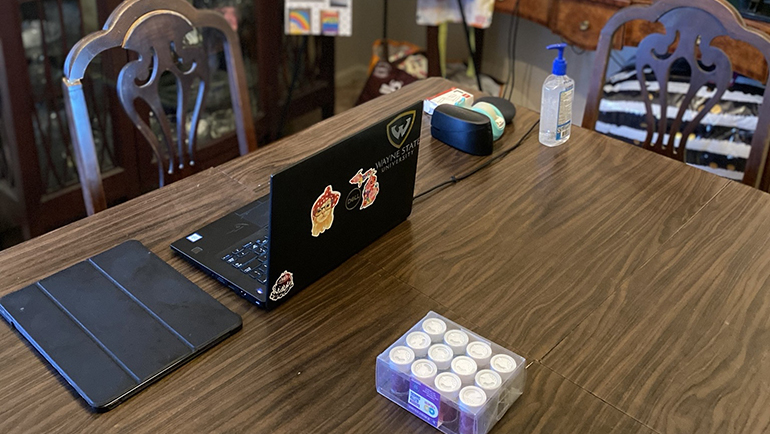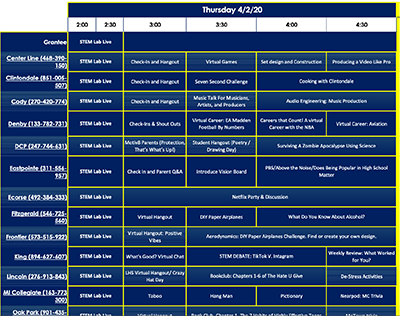
As the COVID-19 pandemic surged across the country, the Wayne State University faculty and administrators behind the C2 Pipeline STEM initiative briefly considered canceling the high school programming that it hosts in classrooms throughout metro Detroit.
Rather than silence the program, however, C2 Pipeline leadership decided to amplify their voices, turning to digital technology to make themselves heard over the chasm of social distancing.
C2 Pipeline instructors have created a series of digital learning channels dedicated to each of the 24 high schools served by the program, offering online course instruction in a range of subjects designed to both educate and entertain students who’ve been forced inside.
Using the Zoom conference call application, instructors sit in front of video cameras from 2 to 5 p.m. each weekday and remotely broadcast lessons that cover everything from cooking and artwork to gardening and the science of hair coloring. In keeping with the program’s core focus, each day begins with a livestreamed STEM lab lesson on each channel.
“It’s a modification of what we’d typically be doing, but it’s something we thought was very important to do,” explained Donald Neal, manager of instructional training grants for the College of Nursing and project director/principal investigator for C2 Pipeline. “Normally, I would have a full-time staff member in each of those schools. But with the shutdown, we had to quickly figure out a way to engage students, so we went to this format.”

Neal said the channels, nicknamed “Zoom rooms,” also allow C2 Pipeline to continue providing the 320 hours of after-school programming it is required to deliver as part of its 21st Century Community Learning Centers grant from the Michigan Department of Education. In addition, the program is looking at ways to provide its summer camp offerings virtually for students without internet access using a “Camp in a Box” concept.
To help students navigate the breadth of offerings, Neal and his team created a programming guide that outlines each day’s activities at each school’s channel. The listings, indexed by subject, school and airtime, read like a page from TV Guide.
Neal conceded that it’s easier to hold students’ attention when they’re in a classroom rather than their living rooms, but said the program still manages to draw strong audiences from across the city, region and even farther away.
“We’ve invited students, virtually, from outside of our schools,” Neal said. “We’ve had families from Washington, D.C., as well as students from the Upper Peninsula come in. The goal is to engage as many students as possible.”
Crystal Cross, the C2 Pipeline site coordinator for Detroit Pershing High School, said the “Zoom rooms” also present some students with a virtual learning experience unique to their studies.
“It is important to continue with our students to keep them interested and give them a safe space and voice,” said Cross. “I hope that keeping in constant contact with the students will spark other students to join and grow the program at my school. This is another learning opportunity that many of the students would not receive in this community.”
Serina Loftis, a site coordinator at Warren Woods Tower High — which normally draws about 13 to 15 students to its channel each day — said that the virtual shift has also opened up opportunities that only a digital space can offer. For instance, her channel recently hosted a “Travel Tuesday” program that took participants on a virtual tour of Singapore.
“We were able to broadcast a lecture by someone who was born there,” said Loftis.
But as unique and engaging as the lessons may be, the program’s coordinators said that the programming also offers students something just as critical and far more familiar: a human connection.
“It affects kids to not see their classmates and friends,” said Loftis. “So we will continue to work virtually for them. I don’t think there are many [grant awardees] doing what we are doing: keeping it virtual and trying to keep the kids interactive.”
The C2 Pipeline “Zoom room” guide can be found at www.c2pipeline.wayne.edu/virtual. To register for the program’s day camps, visit https://waynestate.inforeadyscale.com/hub and search for “C2 Pipeline.”
